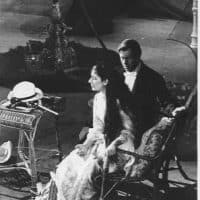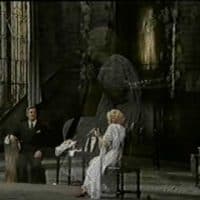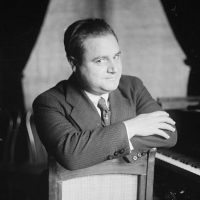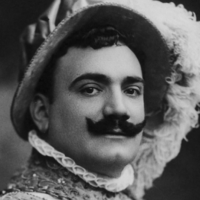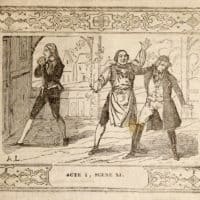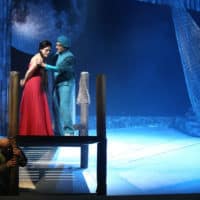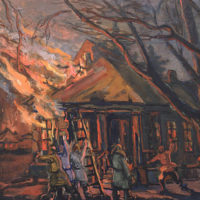Athletes and performers are famous for their superstitions. Mistakes are public and can be devastating, so it makes sense that they’d want a little extra help from luck. (If I make a typo while writing this blog post, I can just fix it. A soprano who sings the wrong note in an opera house has no chance to take it back—it has already been heard by thousands.) Many performers have their own, private rituals, but some things are generally acknowledged as good or bad luck.
Pre-show wishes
As most people who go anywhere near the stage know, “good luck” is very bad luck indeed. But it still seems rude not to wish your mezzo friend the luck she’ll need to be heard over the prima donna, so what do you say? For those of a German or Yiddish bent, “toi, toi, toi” is the magic formula. It’s a shortening of “Teufel” (German for “devil”), and the idea is that naming the devil will keep him away. If you’re more Italianite, “in bocca al lupo” (“in the mouth of the wolf”) is common. You might get a response, “crepi!” or “crepi il lupo” or “speriamo que crepi” (all, roughly, “I hope he dies”). This one comes, predictably enough, from hunting traditions. I’ll leave you to look up your own translations for the less common but more colorful formula “in culo alla balena” (response: “speriamo que no caghi”).

The color purple
It is often whispered that the color purple is bad luck for singers (and possibly even for opera-goers). The origins of this superstition are unclear, though it might have to do with the association between purple and funerals in Italian culture.
Cursed operas
La forza del destino: Verdi’s 1862 opera (based on a Spanish Romantic melodrama) is generally considered cursed. This is largely due to baritone Leonard Warren, who died of a cerebral hemorrhage mid-performance at the Met while singing the role of Don Carlo in 1960. In a particular bit of tragic irony, he keeled over immediately after completing the aria that begins “morir, tremenda cosa” (“to die, an awful thing”). Smaller stories of the Forza curse also abound. Houses seem unusually prone to power outages when performing it. The world premiere was delayed for nearly a year when the soprano contracted a serious illness.
(A side note: while The Makropulos Case is not generally considered cursed, a similar incident happened at its Met premiere, when Richard Versalle died of a heart attack after singing “you can only live so long”.)
Tristan und Isolde: The first Tristan, Ludwig Schnorr von Carolsfeld, died shortly after the opera’s 1865 premiere (which was presumably also bad fortune for the first Isolde, his wife Malvina).Two conductors (Felix Mottl, in 1911, and Joseph Keilberth, in 1968) both died of heart attacks while conducting Tristan‘s second act. The Met also had bad luck with their 1959 Tristan, when three tenors announced they were all too sick to sing the role. (Each sang one act.) Tristan‘s bad luck predates its premiere: Wagner’s wife separated from him while he was composing the opera (because she discovered his attachment to his muse Mathilde Wesendonck). The opera was long and difficult to write, to arrange to have produced, and to rehearse. Malvina’s illness delayed the premiere, which was badly received.

Tosca: Of all the curses, this one is probably the most well-founded. Any opera that ends with the soprano jumping to her death is bound to accumulate a pile of broken bones. Elisabeth Knighton Printy broke both legs in her jump in 1993 at Minnesota Opera. Eva Marton suffered a broken jaw at the Met in 1986, caused when her Scarpia elbowed her in the face. There’s also the infamous (though likely apocryphal) story of the “bouncing Tosca”. The legend goes that stagehands replaced an unpleasant diva’s mattress with a trampoline, so that she bounced back into view after her climactic leap. Both Maria Callas and Galina Vishnevskaya had their wigs catch fire in separate productions of Tosca, which also seems like pretty awful luck. (Hey, perhaps Angela Gheorghiu can blame her missed entrance on the curse, too!)
Other curses: Macbeth is sometimes mentioned as a cursed opera, though this seems to be a holdover from straight theater traditions (where even mentioning the play’s name is sure to cause accidents). A coach at the Met (Bantcho Bantchevsky) did die backstage during intermission in 1988 after falling (or possibly jumping) from a balcony. Donizetti probably also thought his Roberto Devereux brought bad luck, because his wife, mother, and father all died in the year leading up to its premiere.
